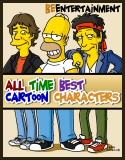TV Home / Entertainment Channel / Bullz-Eye Home
 Buy your copy from Amazon.com
Buy your copy from Amazon.com
| Wait Till Your Father Gets Home: Season One (1972) Director: Various Category: Comedy |
As a kid growing up in Virginia, it was a regular summer tradition for my family to venture forth on a two-hour expedition to Kings Dominion. The amusement park is now owned by Paramount, meaning that anything within the domain of that company is fair game for a ride (“Tomb Raider: Firefall,” “The Italian Job Turbo Coaster,” and so forth). But back in the ‘70s and ‘80s, the majority of the place was themed around Hanna-Barbera productions. We’d park in the Funky Phantom lot, then we’d go ride the Scooby-Doo Coaster, or the Squidley Diddley (he was an octopus, you know), or the Jetson Jets. It seemed as though the park utilized virtually every character owned by the company, from Atom Ant to the Great Grape Ape, and after a few of these annual trips, I felt like I was as well-versed in Hanna-Barbera lore as any kid could be.
It was, therefore, a bit surprising the first time I ever read about “Wait Till Your Father Gets Home,” a series produced by Hanna-Barbera in the early 1970s. What proved downright shocking, however, when I discovered that the big reason I hadn’t been familiar with the show was that it had aired in prime time! True enough. In fact, “Wait Till Your Father Gets Home” was the only animated sitcom to appear in prime time between the demise of “The Flintstones” and the debut of “The Simpsons.” So why is the series little more than a pop culture footnote? Well, mostly because the show is a complete and total artifact of its time.
“Wait Till Your Father Gets Home” originated as an episode of the comedy anthology series, “Love, American Style,” entitled “Love and the Old-Fashioned Father,” and that title goes a long way toward setting the stage for the show. Spotlighting the Grand Canyon-sized chasm that the Generation Gap had become during the turbulent ‘60s, “Wait Till Your Father Gets Home” focused on Harry Boyle (Tom Bosley). He's a working schlub in his 40s with a wife, two intellectually rebellious teen-age kids (one of each gender to keep it even), and a smart-mouthed young son. Harry is Joe Average, basically, and all he wants is for the world to stay the way it’s always been, which means he can’t readily wrap his head around his daughter wanting to wear revealing clothing or his son standing up for civil rights. The similarity between “All in the Family” is obvious, but Harry’s actually a pretty open-minded guy, once he settles down and learns to accept change. The Archie Bunker character for the series is Harry’s next-door neighbor, Ralph (Jack Burns), who’s always ready with a slur or close-minded comment.
At the time, “Wait Till Your Father Gets Home” was a pretty revolutionary show. From a comedic standpoint, it’s not as biting as, say, “Family Guy” or “The Simpsons,” but it was a unique way to look at the events of the day. Of course, things were changing so fast in society that many of the topics of discussion were practically out of date by the time the episodes aired, but, man, the topics were pretty heavy for the early ‘70s, with sexuality getting a lot of play. The first episode focuses on concerns that Harry is having an affair, and in another, an old lady in the neighborhood gets very excited when someone offhandedly throws the word “orgy” into a conversation. There’s a lot of funny material within the various episodes – count on any scene involving Ralph to result in several laugh-out-loud lines. But more often than not, you may find yourself musing on how well the show would work within the curriculum of a class about the history of the second half of the 20th century.
In closing, while I’d be extremely surprised if the first season of “Wait Till Your Father Gets Home” sells enough copies to warrant the release of the second season, I’d be very curious to see what it was like. Season Two was jam-packed with celebrity cameos, including Don Knotts, Don Adams, Jonathan Winters and Phyllis Diller. (I suspect it’s in no way coincidental that all four of these people also appeared on episodes of “The New Scooby-Doo Movies.” What do you want to bet that the recording sessions for both shows were done on the same day?) I’ve heard of network meddling, but when a series’ first season makes mention of orgies and Commies and its second season features an episode entitled “Rich Little, Supersleuth,” something’s gone horribly, horribly wrong somewhere, and I’m perversely curious as to just how bad things got.
Special Features: As has become a staple of these Hanna-Barbera sets, there are two very nice featurettes. “Animation for the Nation” sets the stage for the era in which the show originally aired, and “Illustrating the Times” describes the animation style of the series and how it matched the time period. They’re both interesting, certainly, and well worth watching, but you have to wonder who selected the talking heads to contribute to them. Former California Governor Gray Davis, okay, he provides a political look. Gary Owens, sure, he was part of the Hanna-Barbera stable of voice actors, not to mention the announcer for “Laugh-In.” But…Leif Garrett? I like “I Was Made For Dancin’” as much as anyone, but his appearance in this set screams “charity case.” And where are all the folks who provided the original voices for the show? The character designers and animators make appearances – including the late Iwao Takamoto, in what surely must’ve been one of his final interviews – but no Tom Bosley? No Jack Burns? C’mon, every single member of the cast is still alive. Can it really be possible that none of them would participate? And one final quibble: it’s disappointing that they couldn’t manage to include the aforementioned “Love, American Style” episode that spawned the series as a bonus.
~Will Harris
wharris@bullz-eye.com






